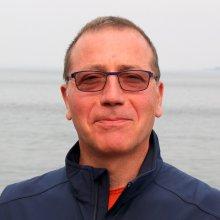
Daniel Kohn
Tell us about your work / research. What kinds of things do you do?
I am an artist, a painter, who uses his senses to understand the world. This has led me not only to explore the diversity within a culture, how the point of view influences how we see (and understand) that world. I was born in India to French and American parents, am of a secular Jewish family, so these different threads showed me early that understanding is structured by the contexts we are in. In the past 14 years, I have been using that point of departure to investigate the space of science, and more recently, to look into a singular question. Does the ocean have memories?
What sparked your initial interest in your career?
In college, I was initially drawn to both social science (anthropology and history) and to art. But realized that it was too easy to affirm a meaning using words, to say: "this is like this...", whereas, with painting, I found that the image was always there, in the end, mysterious and ready to be reinterpreted by another gaze. It is an open framework, an invitation to ask how? And why?
Who influenced you or encouraged you the most?
Mostly people who can make work with their hands and/or talk about their work in the context of the larger world, of larger philosophical questions. Among these are the sculptor Richard Serra, the painters Joan Mitchell, Giorgio Morandi, the physicist Fritjof Capra who wrote the Tao of physics, and more recently Lee Smolin, who just writes beautifully of modern physics in the context of history, our own cultures, and meaning in the universe rather than just of physical laws. And the teachers who pulled and pushed, and thrilled me along the way, Bonnie Miller, Denzil Hurley and Judith Mann among many others.
What element of your work / study do you think is the most fascinating?
Artmaking is both fascinating and exhausting. To wake up every morning not knowing what new questions will appear, nor how I will answer them. Not knowing which dream will form and where it will take me in the waking world. For example, in 2003 I met a geneticist. This one encounter took me on a 10-year journey into the world of genetics, and an ongoing exploration of the space between art and science. Knowing that I do not know, that so much still needs to be discovered and understood is ultimately what keeps me going.
What other jobs led you to your current career?
Many jobs helped support my art-making before it earned anything, I did construction, taught English and art in a couple of high schools, build sets for rap videos, but alongside this, I made a place to make art. It’s a somewhat private place that isn’t always very productive or rewarding. There seem to be many roads to artistic practice.
What are your degrees and certifications?
Since I started working with scientists I usually joke that I am always the least educated person in the room. I have a BA with a focus on art. That’s it. However, that has not stopped me from a lifelong pursuit of knowledge, to insist that one must ask questions of the world. And always to ask why does this matter? Not to just make for oneself, but also for others, as a way to inch our larger culture along, perhaps to a place of greater understanding and compassion.
What are your hobbies?
I like to put things on wheels and mostly use my bicycle to get around Brooklyn, where I live. I just picked up the bass guitar, as a way make and hear a sound, to reconnect with music, which I had stopped making (earlier in my life I played a variety of wind instruments of the sax/clarinet variety). I am interested in recording sound above and underwater.
What advice would you give to someone who wants to have a career like yours?
Use your skills to ask questions, always. This sounds cliche, but follow your dreams, both the waking and the sleeping kind. Trust both your mind and your senses. Do not hesitate to follow a hunch, an intuition. The initial spark may need many years of work to become a fire, so you will need to persevere. Remember to look kindly upon your own effort and at the world, and to laugh. Remember that every point in the universe is at the center. This is also true for you and me, but also for all the others around you. Learn to hear their point of view. Find the intersections between these. Something unique lies there.
Expeditions
Daniel participated in the following Ocean Exploration Trust expeditions:
